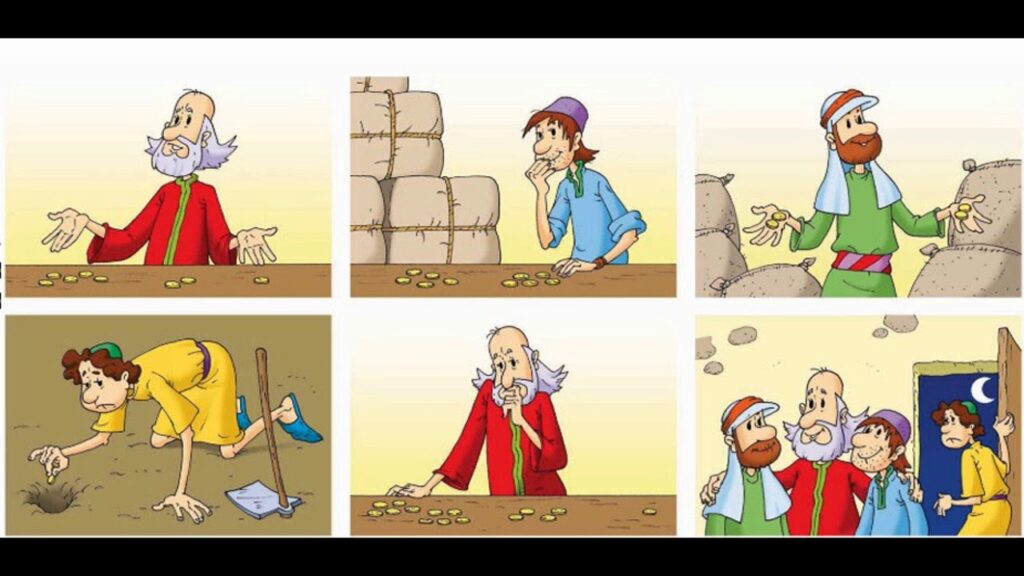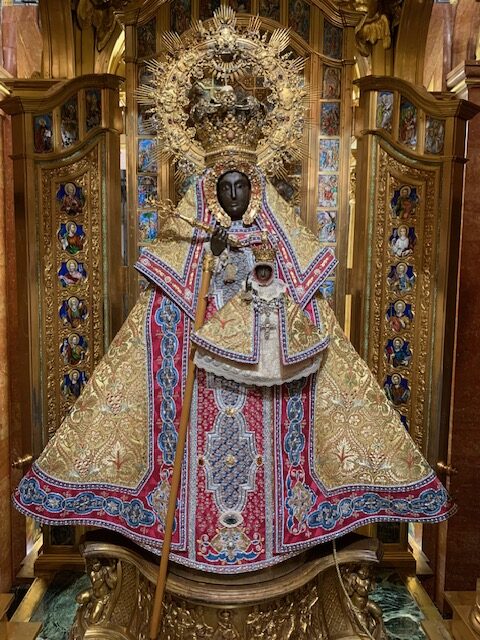
VIRGEN DE GUADALUPE PATRONA DE EXTREMADURA Y REINA DE LA HISPANIDAD
BASÍLICA DE GUADALUPE TEMPLO JUBILAR 2025
Archivos
- octubre 2025
- septiembre 2025
- julio 2025
- mayo 2025
- abril 2025
- marzo 2025
- octubre 2024
- agosto 2024
- marzo 2024
- febrero 2024
- octubre 2023
- septiembre 2023
- agosto 2023
- junio 2023
- mayo 2023
- julio 2022
- abril 2022
- marzo 2022
- febrero 2022
- enero 2022
- diciembre 2021
- noviembre 2021
- octubre 2021
- septiembre 2021
- julio 2021
- junio 2021
- mayo 2021
- abril 2021
- marzo 2021
- febrero 2021
- enero 2021
- diciembre 2020
- noviembre 2020
- octubre 2020
- septiembre 2020
- agosto 2020
- julio 2020
- julio 2018
- junio 2018
- mayo 2018
- abril 2018
- marzo 2018
- febrero 2018
» ALABANZAS AL DIOS ALTÍSIMO»
Publicado en ESPIRITUALIDAD FRANCISCANA
Comentarios desactivados en » ALABANZAS AL DIOS ALTÍSIMO»
REFLEXIÓN Y MEDITACIÓN DEL EVANGELIO DE HOY / 29 DE AGOSTO DE 2020
San Mateo 25,14-30: Parábola de los talentos.

Hoy concluye la lectura continua de mateo con la parábola de los talentos, dentro del contexto del discurso escatológico de Jesús. También hoy leemos por última vez el evangelio de Mateo, que nos ha acompañado durante doce semanas, desde la 10ª hasta la 21ª. No lo hemos leído entero: por ejemplo, dejamos los capítulos finales, con la pasión, muerte y resurrección de Jesús, para los días de la Semana Santa y Pascua. Después de las parábolas del ladrón, de la vuelta del amo y de las jóvenes que esperan al novio, hoy Jesús nos transmite su enseñanza con la de los talentos.
Cada uno tiene que hacer fructificar los talentos que recibió del amo: cinco, dos o uno. No importa cuántos recibió (Dios es libre y sorprendente a la hora de conceder su gracia). Lo que cuenta es si cada empleado ha trabajado o no, si le ha sacado rendimiento a ese capital que se le ha encomendado. Escucha las mismas palabras de alabanza el que recibió cinco que el que sólo dos. En cambio, el siervo perezoso es acusado, no de haber malgastado su talento o robado el dinero de su amo, sino de no haberlo hecho fructificar.
De nuevo resuena la consigna: «estad en vela, porque no sabéis el día ni la hora». Cada uno de nosotros ha recibido sus talentos, y no sabemos cuándo volverá el dueño a pedirnos cuentas del uso que hayamos hecho de ellos. Podemos pensar, ante todo, en los dones naturales que hemos recibido: la vida, la salud, la inteligencia, las habilidades que nos caracterizan (unos son artistas, otros líderes, otros tienen simpatía abundante…). Realmente ¿Sacamos provecho de esos talentos? ¿los sabemos utilizar también para beneficio de la comunidad? ¿o los escondemos «bajo tierra» por pereza o por una falsa humildad? No somos dueños, sino administradores de los dones que Dios nos ha hecho, y que se presentan aquí como un capital que él ha invertido en nosotros.
Pero seguramente se trata, en la intención de Jesús, también de los dones sobrenaturales que Dios nos ha querido conceder. Ya Israel había tenido, en comparación con los otros pueblos, gracias muy especiales, como pueblo elegido de Yahvé. Y no supo aprovecharlas. Los cristianos todavía tenemos más gracias y dones: Cristo Jesús como Salvador y Maestro, el don de su Espíritu, la Palabra de Dios, la comunidad eclesial, la fe, los sacramentos. ¿Qué fruto les estamos sacando? ¿se nos podría acusar de apatía o de pereza? La excesiva «prudencia» del tercer siervo sería en nosotros un claro «pecado de omisión», del que también tenemos que arrepentirnos. No se trata sólo de no hacer el mal, sino de hacer el bien que Dios espera que hagamos. Como el árbol, del que se esperan frutos, y no sólo apariencias.
Nosotros no sabemos cuántos años nos quedan de vida y cuándo seremos convocados a examen. Pero todos deseamos que el examinador, el Juez, nos pueda decir las palabras que él guarda para los que se han esforzado por vivir según sus caminos: «Muy bien. Eres un empleado fiel y cumplidor. Como has sido fiel en lo poco, pasa al banquete de tu señor».
¡Paz y bien!
Fr. Antonio Majeesh George Kallely, OFM
Publicado en REFLEXIÓN Y MEDITACIÓN DEL EVANGELIO
Comentarios desactivados en REFLEXIÓN Y MEDITACIÓN DEL EVANGELIO DE HOY / 29 DE AGOSTO DE 2020
REFLECTION AND MEDITATION OF TODAY’S GOSPEL / AUGUST 29, 2020
Saint Matthew 25,14-30: Parable of the talents.

Today the continuous reading of Matthew concludes with the parable of the talents, within the context of Jesus eschatological discourse. Also, today we read for the last time the Gospel of Matthew, which has accompanied us for twelve weeks, from the 10th to the 21th. We have not read it in full: for example, we leave the final chapters, with the passion, death and resurrection of Jesus, for the days of Holy Week and Easter. After the parables of the thief, the return of the master and the young women who are waiting for the bridegroom, today Jesus transmits his teaching to us with that of talents.
Each one has to bring to fruition the talents he received from his master: five, two or one. It doesn’t matter how many he received (God is free and amazing to grant his grace). What counts is whether each employee has worked or not, if they have made a profit from that capital entrusted to them. Hear the same words of praise for the one who received five as the one who only received two. Instead, the lazy servant is accused, not of having wasted his talent or stolen his master’s money, but of not making it bear fruit.
Again, the slogan resounds: «stay awake, because you do not know the day or the hour.» Each of us has received his talents, and we do not know when the owner will return to hold us accountable for the use, we have made of them. We can think, above all, of the natural gifts we have received: life, health, intelligence, the abilities that characterize us (some are artists, others leaders, others have abundant sympathy …). Do we really take advantage of those talents? Do we also know how to use them for the benefit of the community? Or do we hide them «underground» out of laziness or false humility? We are not owners, but stewards of the gifts that God has made us, and that are presented here as a capital that he has invested in us.
But surely it is a question, in the intention of Jesus, also of the supernatural gifts that God has wanted to grant us. Israel had already had, in comparison with the other peoples, very special graces, as Yahweh’s chosen people. And he did not know how to take advantage of them. Christians still have more graces and gifts: Jesus Christ as Saviour and Teacher, the gift of his Spirit, the Word of God, the ecclesial community, faith, the sacraments. What fruit are we getting from them? Could we be accused of apathy or laziness? The excessive «prudence» of the third servant would be in us a clear «sin of omission», of which we also have to repent. It is not just about not doing evil, but about doing the good that God expects us to do. Like the tree, from which fruits are expected, and not just appearances.
We do not know how many years we have left to live and when we will be summoned for examination. But we all want the examiner, the Judge, to be able to tell us the words he keeps for those who have tried to live according to his ways: “Very good. You are a faithful and reliable employee. As you have been faithful in the little, go to the banquet of your master.
Peace and good
Br. Antonio Majeesh George Kallely, OFM
Publicado en REFLEXIÓN Y MEDITACIÓN DEL EVANGELIO
Comentarios desactivados en REFLECTION AND MEDITATION OF TODAY’S GOSPEL / AUGUST 29, 2020









